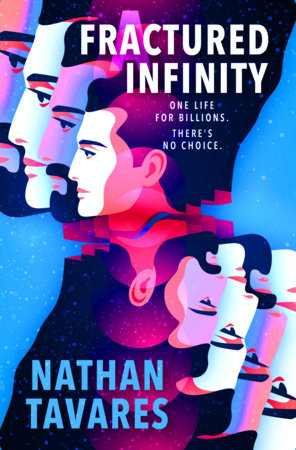
Hey PAT @ Giovanni’s Room folks!
My name is Nathan Tavares and I’m the author of A Fractured Infinity, which came out last year from Titan Books. It’s my pleasure to temporarily usher you into an alternate reality—or at the very least take the reins of the blog for this guest post, where I’ll talk a little about my queer sci-fi debut novel, which I hope you’ll love.
For as long as I can remember, I have been a huge fan of all things sci-fi and weird, from the Goosebumps books I devoured as a kid, to Greek mythology, to superhero TV shows (namely, running around and trying to be like Xena). As I got older and figured out I was gay (Surprise! Somebody please tell my husband.), I noticed a big lack of queer people like me in sci-fi stories. What, you could have aliens and robots in these different and thrilling worlds, but no queer people? Weird.
Before I started writing A Fractured Infinity, I was adrift. The magazine I worked for in Boston had closed shop, I was still licking my wounds after a novel I had been working on for years didn’t get picked up by a publisher. I had the idea to just write the kind of book that I had always wanted to read, filled with queer people with big messy lives that weren’t plagued by coming-out trauma. I threw my favorite things in a big blender—fourth wall breaking, sarcasm, and robot drag queens, with a touch of theoretical physics (or a dumbed-down version that my liberal arts major mind could understand, anyway)—and got to writing. My wonderful agent and I pitched the story as “the film Arrival but make it gay,” and I’m thrilled that it’s now on bookshelves.
A FRACTURED INFINITY is near-ish future sc-ifi story about a washed-up filmmaker named Hayes who just can’t catch a break. One day, the physicist Yusuf shows up at his doorstep and whisks Hayes away to a secret research facility, where he learns that he’s somehow connected to a strange predictive device from another universe. And an alternate version of Hayes built it and sent it to our world. Soon, Hayes and Yusuf fall in love, and they must go on the run to save Yusuf’s life—even if that means sacrificing the whole multiverse.
I was really inspired by the cerebral sci-fi films I love so much, namely Contact, Arrival, and Interstellar. Besides those films, I looked to my favorite books to keep me going. Here are a few of them that I hope you’ll love as much as I did.
I reread this book all the time as a reminder of, “oh, that’s how a book should make you feel.” Between the character development, how Atwood weaves time around, and just the beauty of the language, Oryx and Crake is my favorite book ever. My copy is dog-eared and underlined everywhere. I once got a note that my writing in A Fractured Infinity was too pretty at times, and that sci-fi readers want more workmanlike language. I look to Atwood as proof of just the opposite. Sci-fi and speculative prose can still be beautiful and succinct at the same time.
I first read this novel maybe twenty years ago, and it’s stuck with me ever since. When I was thinking up alternate settings and world histories, it was a huge inspiration on how a few different decisions or events could alter a world so drastically. The Lathe of Heaven reminded me a lot about authority and trust you put in an author, too. In grad school workshops, you spend a lot of time picking apart stories and storylines, like “I didn’t buy that decision” or “I’m having a tough time believing this.” Le Guin reminded me with this book, “You know what? Sometimes an author makes a decision with an outlandish concept, and you just have to go along for the ride.”
I love Mastai’s original take on alternate universes and time travel. I read this when I was about halfway through the very first messy draft of A Fractured Infinity, and it inspired me in a big way. It sparked a big light-bulb moment that I needed to dive in and have my characters directly explore other worlds, and meet different versions of themselves.
I used to not write many queer characters in my stories when I was younger. I was probably still dealing with those last bits of shame about being gay, and wasn’t sure how large of an audience for queer stories there was. Reading Baldwin and other queer writers made me remember, “I want to read queer stories, so of course a lot of other people do.” He helped me dive in and write from the queer experience. I also love the conversational style of this novel. One thing that distracts me sometimes when I’m reading is overly-formal language, especially when a book is in the first person. This definitely helped me think of A Fractured Infinity as a like a conversation between my main character and the reader.
How do you pick one of Octavia E. Butler’s books? The world-building here (and the book in general) is so brutal and devastating, balanced out by the perspective of a main character who’s so perseverant. And talk about some scarily accurate predictions. I thought about Parable of the Sower when I was dreaming up a broken, de-United States of America that’s ravaged by climate change and social problems. A Fractured Infinity is definitely way, way less bleak, but the nightmares in Parable of the Sower helped me land somewhere between a dystopia and a technological utopia. Is mid-topia a thing?
Nathan Tavares is a writer from Boston, Massachusetts. He grew up in the Portuguese-American community of southeastern Massachusetts and developed a love for fantastical stories at an early age, from superheroes to mythology. He studied English in college and received his MFA in creative writing from Lesley University in Cambridge, Massachusetts. His editorial work celebrates queer culture and historically excluded communities, with pieces appearing in GQ, Out, and elsewhere.
